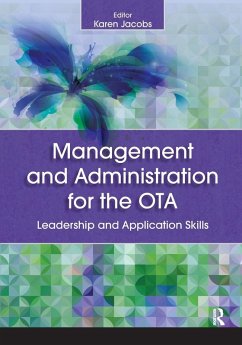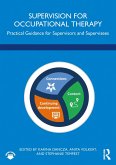Comprehensive skills in management, administration, and leadership are essential for occupational therapy assistants (OTA) in their daily interactions with their clients in various health care environments.
Inside Management and Administration for the OTA: Leadership and Application Skills, Dr. Karen Jacobs has gathered an expert team of 11 contributors of clinicians, academicians, administrators, managers, and graduate students to address each of the ACOTE Standards with a focus on evidence-based literature and examples of the leadership and management skills needed as an OTA.
What you will learn from Management and Administration for the OTA: Contexts and Health Care-the potential impact of policy issues as they relate to the practice of occupational therapyLeadership and Advocacy-two important roles that OTAs need to assume to be agents of changeCredentialing-introduces the national requirements for credentialing and for licensure, certification or registrationunder state lawsReimbursement-the various reimbursement systems requirements that affect the practice of occupational therapyMarketing and Promoting-The role of the OTA to promote the distinct value of occupational therapy to the public, as well as other professionals, service providers, consumers, third-party payers, and regulatory bodiesDocumentation and Quality Improvement-to ensure the OTA provides the highest quality of occupational therapy servicesSupervision-to understand the important relationship between the OTA, the OT, and nonprofessional personnelFieldwork-to understand the role, criteria, and components of the OTA in fieldwork educationCommunication Skills-define health literacy and discuss how to use this concept to better understand the client, the client's health environment, and the client's occupations and health activitiesEthics-explore the components of ethics that impact the delivery of occupational therapy and the foundational skills and knowledge needed by the OTA to maintain high standards of responsible, ethical practiceScholarship and Scholarly Practice-assists the OTA with how to articulate the importance of how scholarly activities and the evidence-based literature contribute to the distinct value and advancement of occupational therapy
The chapters of Management and Administration for the OTA: Leadership and Application Skills also includes 5 key vocabulary terms and their definitions, case examples relevant to the content, website resources, and multiple choice review questions.
Included with the text are online supplemental materials for faculty use in the classroom.
Straightforward, comprehensive, and user-friendly, Management and Administration for the OTA: Leadership and Application Skills will provide OTA students and clinicians with an essential resource for their future success.
Inside Management and Administration for the OTA: Leadership and Application Skills, Dr. Karen Jacobs has gathered an expert team of 11 contributors of clinicians, academicians, administrators, managers, and graduate students to address each of the ACOTE Standards with a focus on evidence-based literature and examples of the leadership and management skills needed as an OTA.
What you will learn from Management and Administration for the OTA: Contexts and Health Care-the potential impact of policy issues as they relate to the practice of occupational therapyLeadership and Advocacy-two important roles that OTAs need to assume to be agents of changeCredentialing-introduces the national requirements for credentialing and for licensure, certification or registrationunder state lawsReimbursement-the various reimbursement systems requirements that affect the practice of occupational therapyMarketing and Promoting-The role of the OTA to promote the distinct value of occupational therapy to the public, as well as other professionals, service providers, consumers, third-party payers, and regulatory bodiesDocumentation and Quality Improvement-to ensure the OTA provides the highest quality of occupational therapy servicesSupervision-to understand the important relationship between the OTA, the OT, and nonprofessional personnelFieldwork-to understand the role, criteria, and components of the OTA in fieldwork educationCommunication Skills-define health literacy and discuss how to use this concept to better understand the client, the client's health environment, and the client's occupations and health activitiesEthics-explore the components of ethics that impact the delivery of occupational therapy and the foundational skills and knowledge needed by the OTA to maintain high standards of responsible, ethical practiceScholarship and Scholarly Practice-assists the OTA with how to articulate the importance of how scholarly activities and the evidence-based literature contribute to the distinct value and advancement of occupational therapy
The chapters of Management and Administration for the OTA: Leadership and Application Skills also includes 5 key vocabulary terms and their definitions, case examples relevant to the content, website resources, and multiple choice review questions.
Included with the text are online supplemental materials for faculty use in the classroom.
Straightforward, comprehensive, and user-friendly, Management and Administration for the OTA: Leadership and Application Skills will provide OTA students and clinicians with an essential resource for their future success.
"This is an excellent tool for teaching OTA students... the way it is written works very well for OTA educators, especially with the ACOTE standards at the beginning of each chapter. This book is excellent on many levels. I was so impressed I will be using it for my OTA students next semester."
- Kay Blose, MOT, OTR/L, University of Charleston-Beckley, Doody's Review Service
- Kay Blose, MOT, OTR/L, University of Charleston-Beckley, Doody's Review Service








